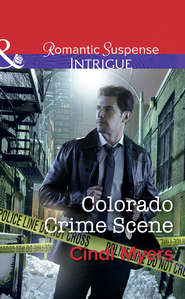По всем вопросам обращайтесь на: info@litportal.ru
(©) 2003-2024.
✖
What She'd Do for Love
Автор
Год написания книги
2019
Настройки чтения
Размер шрифта
Высота строк
Поля
The frantic scramble of toenails on the hardwood floor signaled the arrival of Jet, her parents’ elderly Jack Russell terrier. Though he was growing deaf and slowing down, he still greeted her enthusiastically, jumping up and down on stiff legs and letting out excited yips. She rubbed his ears and patted his back. “Oh, Jet, it’s good to see you, too.”
“Christa? Is that you?” Her father, his voice hoarse from years of shouting at cows and cowboys over the howl of wind or the drone of machinery, emerged from the back of the house. Dressed in faded jeans and a gray snap-button shirt with a patch on one elbow, he looked more like a down-on-his-heels ranch hand than a prosperous ranch owner. His hair, which had more silver in it than she remembered, curled up at his frayed shirt collar, and needed combing. She stared. Had she woke him from a nap? In the middle of the day?
Her father’s gaze dropped to the suitcase in her hand, then back to her face. “What are you doing here, honey?” he asked.
Not the enthusiastic welcome she’d expected. Her stomach tightened. Yes, she should have called ahead. She should have thought this out more. But she’d given up her apartment in Houston and put her furniture in storage. Only the thought of coming home, of being taken care of for a little while so she could regain her strength, had kept her from falling apart. “I’ve come home, Dad,” she said. “Just for a little while.”
His eyes narrowed and his expression hardened. “Who have you been talking to?”
“No one.” She felt like a kid again, caught joy-riding on the tractor, or staying out past curfew. She half-way expected her dad to tell her how disappointed he was in her and to sentence her to mucking out horse stalls every Saturday for the next month. “I lost my job. Pemberton Professionals laid off one-quarter of their employees and I was one of them. I thought...I thought I could stay here a while, until I decided what to do next.”
“Aw, honey.” Dad rubbed his jaw, his hand scraping against a day’s growth of beard. “You know your mom and I are always glad to see you.”
Except he didn’t sound very glad. “Where is Mom?” Christa asked. Suddenly, she wanted nothing in the world as much as a hug from her mother.
“She’s resting. You can see her later.”
“Bud?” Her mother’s voice, sounding old and tired, interrupted them. “Who’s there?”
Not waiting for her dad to intervene, Christa abandoned the suitcase and, with Jet on her heels, headed down the hallway that led to her old room on one side, with her parents’ room at the end. The flowered carpet runner that stretched down the hall muffled her footsteps. When she reached the partially open door to her parents’ room, she forced a cheerful smile to her face and took a deep breath. Her mother would be glad to see her, and Mom would have some reasonable explanation for Dad’s behavior. Then again, what was Mom doing in bed in the middle of the day? Maybe they had been up all night with a sick calf, or any of the other chores that could distract a rancher.
Her mother sat propped in bed, looking a little pale, but otherwise okay. Jet hopped onto the bed and curled up beside his mistress. “Mom, is something wrong?” Christa asked.
“I’m just resting my eyes.” Mom sat up straighter against the piled pillows and fixed Christa with the same look with which she’d questioned bad grades or poor choices in boyfriends. “What are you doing here in the middle of a work week?”
Christa sat on the edge of the bed. Though she’d rehearsed this conversation over and over on the drive up from Houston, and in the days before that, now that the moment was here her carefully prepared words deserted her. “I got laid off and between my student loan payments and my car payments things are really tight right now. I was hoping I could stay here a few months—just until I can get my life back together.”
Mom’s gaze darted to Dad, who had followed Christa into the room and stood in the doorway, his still-broad shoulders filling the frame. “Of course you can stay,” Mom said. “Your old room is just like you left it.”
“Are you sure everything is okay?” Christa asked. “You and Dad don’t seem very happy to see me.”
“You just caught us by surprise,” Mom said. “Of course we’re very happy to have you home.”
“Are you sure? I feel like I caught you at a bad time. Why are you in bed? Are you sick or something?”
“She’ll be fine. She got too tired yesterday, helping me move cattle. That’s all.” Her father’s tone was brusque, but the tenderness in his expression when he looked at his wife made Christa’s eyes sting. Something was going on here—some silent message passing between husband and wife in a code she couldn’t break.
“Then I’d better let you rest.” She stood and moved toward the door. Jet looked up and thumped his tail, as if to say “Don’t worry, I’ll look after her,” then laid his head back on his paws and closed his eyes. Father and daughter tiptoed from the room, and he shut the door softly behind them.
But Christa couldn’t as easily shut the door on her worries. Her mother was one of the most vibrant, active women she knew. Adele Montgomery had spent a lifetime riding horses, hauling hay, cooking for cowboys, and managing the Rocking M alongside her husband. To see her in bed in the middle of the day had been more unsettling than Christa could have imagined. “Are you sure she’s okay?” she asked.
“That’s enough now, Christa. She’ll be fine.” Dad sank into the leather recliner that over the years had formed itself to the shape of his body. Christa sat on the sofa across from him. “Tell me the truth about what’s going on with you,” Dad said. “Are you broke? Do you need money?”
“I still have a little left in savings. Staying here will allow me to stretch that out.”
“So Pemberton just let you go?”
“They let a lot of people go.” She struggled not to squirm under her father’s hard gaze. “I didn’t have a lot of seniority, so I got the ax.” Even though she knew losing her job wasn’t her fault, the loss hurt.
He nodded. “Times are hard all over. They say the economy’s picking up, but I think it’s like one of those big cruise ships—takes a while to turn it around. You’ll find another job.”
Absolutely she would—as soon as she worked up enough nerve to send out some applications. The layoff had been such a paralyzing blow all she could think to do was to come home. Here, she was sure she’d find the strength to recover and get on with her life. She just hadn’t expected things to feel so different in a place that had always been familiar. “Speaking of the economy, what’s going on in town?” she asked. “I was shocked when I drove through—so many closed businesses.”
“People would rather shop in the city these days,” Dad said. “Between the drought and folks having a tough time financially, it’s been a real challenge for some to hang on.”
“Maybe some new businesses will come in,” she said.
He shook his head. “I doubt it. The state’s going to build a new highway that bypasses Cedar Grove and offers a more direct route into Dallas.”
Why hadn’t Dad mentioned this in one of her weekly calls home? “When did this happen?” she asked.
“Oh, they decided it months ago,” he said.
“You never said anything.”
“I didn’t think it would interest you. After all, you don’t live here anymore.”
“But this will always be my home. Of course it matters to me. How can they just decide to divert traffic that way? They must know how much it will hurt the town.”
He shrugged. “It’s the state. They can do what they want.”
“Without even asking the people what they want? Didn’t anyone in town object— protest?”
“Oh, a few people wrote letters to the editor and to their congressmen. But it didn’t make any difference in the end. Now we’ve accepted it and are focused on getting on with things the best we can.”
“But you can’t...let the town die.” She felt like crying all over again. Cedar Grove was home as much as the ranch was. She’d bought her first prom dress at Mavis Butler’s dress shop, with money she’d made working part time at the grocery store. Her first date with Jordan Ledbetter had been to the movies at the Bijou Theatre, and her high school band had marched down Main Street every Fourth of July in the parade.
“The town won’t die,” Dad said. “It will simply change. Everything changes.”
“But not every change is good.” Her home wasn’t supposed to change that drastically—home was supposed to be the one constant in her life that she could count on. “Someone should do something to stop this.”
“I don’t know what to tell you,” he said. “But I have more important things to worry about than a highway project.”
She waited for him to elaborate on what those things might be, but he’d fallen silent, staring off into the middle distance. She wondered if he even remembered she was here. With his graying hair and hunched back, he looked so much older than she remembered—her father wasn’t supposed to get old. He was always supposed to be the tough cowboy, sitting tall in the saddle, master of his domain. The man who could fix anything and solve any problem for his little girl.
But she wasn’t little anymore, and even though she’d run back home, she couldn’t expect her parents to solve all her problems. “Thanks for letting me stay for a while,” she said. “I promise I’ll do my share around here, and I’ll leave before I wear out my welcome.”
She expected him to say she was always welcome here, but that part of the familiar script had changed, too. He hefted himself out of the recliner. “Come on. Let’s get the rest of your things out of your car and get you settled. You’ll need to put sheets on the bed.”
“Don’t worry about it, Dad. I’m here to help, not to make more work.”
He surprised her then, by slipping his arm around her and pulling her close in a hug so hard she feared her ribs might crack. “It’s good to see you, Pumpkin,” he said. “You caught us by surprise, but now that you’re here, we’re glad.”
She blinked back stinging tears and laid her head on his shoulder. How many times over the years had he held her while she cried about everything from a lost dog to a boy who’d hurt her feelings? At least he hadn’t changed; he was still the strong cowboy she could always rely on to be there for her. “Thanks, Dad. I’m glad to be here.” Really glad. Now she could start her life heading in the right direction again, with home as the unchanging, fixed anchor point from which she could launch herself into the world once more.
The next morning Christa was surprised to find her mother seated at the breakfast table, sipping coffee and reading the paper, Jet curled at her feet, while her father scrambled eggs and made toast. “You’re making breakfast?” Christa asked, unable to hide her surprise. Her mother was the one who cooked, while her father read the paper.
“I can do a lot of things you don’t know about. Coffee’s over there.” He nodded to the current generation of the drip coffeemaker that had been a fixture in that corner of the kitchen for as long as Christa could remember.











